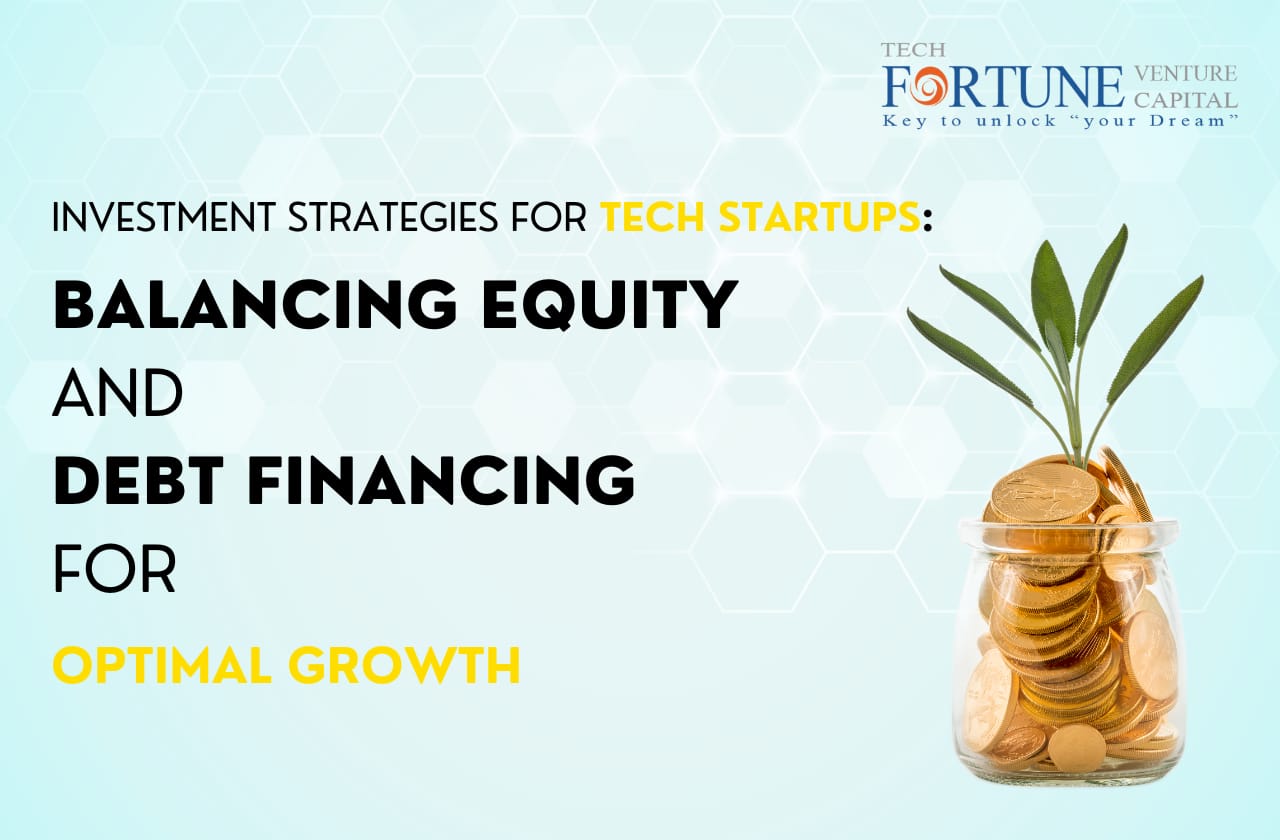“Investment Strategies for Tech Startups: Balancing Equity and Debt Financing for Optimal Growth”
“Accelerate your startup’s journey with strategic capital planning”
In the fast-paced world of tech startups, securing the right funding is crucial for achieving growth, scaling operations, and staying competitive. The primary question founders often face is how to finance their business: Should they give up equity or take on debt? Finding the right balance between equity and debt financing is a critical decision that can significantly influence the trajectory of a startup. In this blog, we will explore the key considerations for tech startups in balancing equity and debt financing, the advantages and disadvantages of both options, and strategies for leveraging them for optimal growth.
Understanding Equity Financing
Equity financing refers to raising capital by selling shares of the company to investors. These investors then become partial owners of the business, sharing in its success—and risk. Equity financing is a popular choice for startups, especially in the tech sector, because it doesn’t require immediate repayment and can attract investors who bring valuable industry expertise and connections.
Advantages of Equity Financing:
- No Repayment Pressure: Unlike debt financing, equity financing does not burden the startup with fixed repayment obligations. This allows the business to use the capital to grow without worrying about monthly payments.
- Access to Expertise and Networks: Investors, particularly venture capitalists (VCs) and angel investors, often bring more than just money. They provide mentorship, strategic advice, and connections to potential partners or customers, which can be incredibly valuable for tech startups.
- Lower Financial Risk: With equity financing, the startup isn’t taking on debt that must be repaid, reducing the immediate financial strain on the business. This can be especially important for early-stage startups that have inconsistent cash flow or are operating at a loss.
Other Factors to be considered:
Ownership Dilution: Selling equity reduces the founder’s ownership in the company, which may result in less influence over key decisions if investors hold significant stakes.
Profit Distribution: Equity investors are entitled to a portion of the company’s profits, meaning as the business grows, founders may need to share financial returns with external stakeholders.
Lengthy Process: Raising equity can be time-consuming, requiring investor pitches, negotiations, and due diligence. For startups in rapidly evolving industries, this delay might impact their growth momentum.
Understanding Debt Financing
Debt financing involves borrowing money from lenders with the agreement that it will be paid back over time, typically with interest. Startups retain full ownership of their business, but they must generate enough revenue to meet repayment obligations.
Advantages of Debt Financing:
- Retain Ownership: One of the main benefits of debt financing is that founders maintain full control and ownership of the company. Lenders don’t receive equity, meaning there’s no dilution of ownership or influence over the business’s operations.
- Tax Deductible: Interest payments on debt are often tax-deductible, which can provide financial relief and help lower the overall cost of borrowing.
- Predictable Repayment Terms: Debt financing provides clear terms, including the repayment schedule and interest rates. This allows startups to budget and plan accordingly, knowing exactly how much they need to pay each month.
Disadvantages of Debt Financing:
- Repayment Obligation: Debt financing places an immediate repayment obligation on the startup, regardless of whether the business is profitable. For startups with unpredictable cash flow, this can be risky and potentially limit their ability to reinvest in growth.
- Increased Financial Risk: Taking on debt increases the startup’s liabilities, and failure to meet repayment terms can lead to penalties, a damaged credit score, or even insolvency.
- Collateral Requirements: Many lenders require collateral to secure the loan. In the case of default, the lender may seize the assets pledged as collateral, which could include valuable intellectual property or equipment.
Key Considerations When Choosing Equity vs. Debt Financing
Deciding between equity and debt financing isn’t always straightforward. Several factors should be taken into account to determine which option, or combination of options, best suits your startup’s needs.
1. Stage of the Business:
- Early Stage: Startups in the early stages, particularly pre-revenue or pre-profit, often favor equity financing. Since these startups may not have the cash flow to support debt repayment, selling equity allows them to raise capital without the immediate pressure of repayment.
- Growth Stage: Startups that are scaling quickly and generating revenue may find debt financing a viable option. With predictable cash flow, they can meet repayment obligations while retaining full ownership.
2. Risk Tolerance:
- If your startup is in a high-risk industry or has an unproven business model, taking on debt could be risky. If the business fails to generate sufficient revenue, the debt could become unmanageable. In such cases, equity financing may be a safer bet, as the risk is shared with investors.
- Conversely, if your startup has a strong business model and predictable cash flow, debt financing may offer the best of both worlds—capital without loss of ownership.
3. Amount of Capital Needed:
- Small Capital Needs: For small amounts of capital, debt financing through a line of credit or short-term loan may be more appropriate. This allows you to cover immediate costs without giving up equity.
- Large Capital Needs: For significant funding rounds, equity financing or a combination of equity and debt may be necessary. Venture capitalists and angel investors are often more willing to provide large sums, especially for tech startups with high growth potential.
4. Investor Expertise:
- If your startup could benefit from strategic partnerships, industry expertise, or access to a wider network, equity financing can provide more than just capital. Experienced investors can offer mentorship, open doors to business opportunities, and provide credibility in the market.
5. Cost of Capital:
- The cost of equity can be high in the long run, as you’re giving away a portion of your future profits. However, if your startup grows rapidly, the value investors bring may far outweigh the cost.
- Debt financing, on the other hand, comes with fixed costs in the form of interest payments. If your business can handle the repayments, this may be a more affordable option over time.
Blending Equity and Debt: A Hybrid Approach
Many successful tech startups use a hybrid financing strategy, combining both equity and debt financing. This allows startups to balance the benefits of both methods, raising enough capital for growth without giving up excessive equity or taking on unsustainable debt.
Example of a Hybrid Approach:
- Early-Stage Equity Financing: In the early stages, you might raise equity funding from angel investors or venture capitalists to get your product off the ground and attract early customers. This gives you the flexibility to invest in product development and marketing without the pressure of debt repayment.
- Growth-Stage Debt Financing: As your startup scales and starts generating revenue, you could take on debt financing to fuel further growth, such as expanding operations or hiring new talent. By this stage, your cash flow should be more stable, allowing you to manage debt repayments without putting your business at risk.
- Convertible Debt: Another option is convertible debt, which starts as a loan but can be converted into equity if certain conditions are met. This can provide flexibility for both the startup and the investors, offering the best of both worlds.
Sum Up: Finding the Right Balance for Optimal Growth
“Scale your tech business with expert-backed funding solutions”
For tech startups, the decision between equity and debt financing isn’t an either-or proposition. By carefully considering your business’s stage, risk tolerance, and capital needs, you can strike the right balance between the two. Whether through equity, debt, or a combination of both, the goal is to secure the capital needed to grow your business without compromising its long-term potential.
At the end of the day, understanding the trade-offs between equity and debt financing is essential for startup founders. With the right strategy in place, you can fuel your tech startup’s growth, maximize its value, and retain control as you scale to new heights.
At Techfortune Venture Capital, we offer a unique approach to assisting entrepreneurs in navigating the challenges of equity and debt financing for tech startups. Our team of experienced investors and advisors helps startups find the right balance between these financing options, ensuring sustainable growth without compromising control. With our strategic guidance and financial backing, startups can access the capital they need to scale while benefiting from industry expertise, mentorship, and valuable connections. Partner with Techfortune Venture Capital to build a solid financial foundation for your business and achieve long-term success in today’s competitive tech landscape. Let us help you grow your vision into reality.

